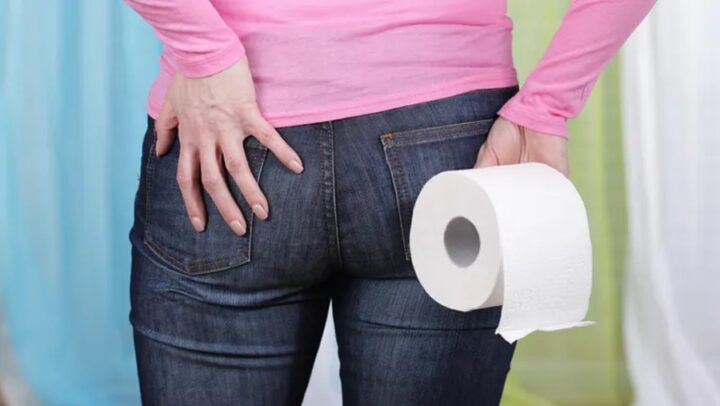
What is Constipation? Its can have serious consequences
Problems with bowel movements are not only uncomfortable, but also pose health risks. Squeezing and straining on the toilet can cause or worsen hemorrhoids, among other things.
Constipation is a common symptom. In almost everyone, the intestine occasionally gets stuck. Bowel movements usually return to normal within a few days. Sometimes, however, constipation lasts longer and becomes chronic. A frequent consequence are haemorrhoids, small vascular cushions that form in the intestinal wall between the rectum and the sphincter muscle at the anus. But there are other ailments caused by constipation. Read here what they are and how you can support your digestion.
What is constipation?
According to the “Chronic Constipation” guideline of the German Society for Gastroenterology, Digestive and Metabolic Diseases (DGVS) and the German Society for Neurogastroenterology and Motility (DGNM), chronic constipation is present when the following three criteria have been present for at least three months consist:
More than two of the following symptoms are present: lumpy or hard stools in more than 25 percent of stools, straining in more than 25 percent of stools, subjective incomplete voiding in more than 25 percent of stools, subjective obstruction in more than 25 percent of Bowel movements, manual maneuvers to facilitate defecation in more than 25 percent of bowel movements, fewer than three spontaneous bowel movements per week
Soft stools are rare without the use of laxatives.
The criteria for irritable bowel syndrome are not met.
professor dr medical Heiner Krammer is a specialist in internal medicine with additional qualifications in gastroenterology, proctology, coloproctology (BCD) and nutritional medicine (DGEM) at the End- und Colon-Zentrum Mannheim and a member of the Scientific Advisory Board of the Gastro-Liga e.V.
Constipation makes life difficult
For those affected by chronic constipation, the quality of life can be significantly reduced. Abdominal pain, abdominal cramps, pressure in the intestines, nausea, pain during bowel movements and the feeling of incomplete emptying are very stressful. Added to this is the frustration when “it doesn’t work out again”. What many are not aware of: Persistent constipation can lead to further health problems in the long term.
Chronic constipation has consequences for the intestines
Almost everyone is familiar with constipation. Going to the toilet is not always “successful”. Eating heavy food or not drinking enough fluids can slow the movement of stool. Constipation becomes a problem when it persists.
“Chronic constipation can promote hemorrhoidal disease, among other things,” says
professor dr medical Heiner Krammer, specialist in internal medicine with additional qualifications in gastroenterology, proctology, coloproctology (BCD) and nutritional medicine (DGEM) at the End- und Colon-Zentrum Mannheim and member of the Scientific Advisory Board of the Gastro-Liga e.V. “The risk of fecal incontinence and anal fissures also increases , an anal prolapse and bowel protrusions.”
The connective tissue in the intestines and pelvic floor suffers long-term damage from the constant pressure and straining on the toilet and the stretching from the chair. Chronic constipation should therefore always be treated. On the one hand, to alleviate the suffering of those affected and, on the other hand, to prevent health consequences.
Hemorrhoids: The most well-known consequence of constipation
Hemorrhoids are one of the most well-known consequences of persistent constipation. Everyone has hemorrhoidal tissue. The erectile tissue-like vascular cushions, together with the musculature of the sphincter, ensure the fine closure of the anus. Hemorrhoids become problematic when they become pathologically enlarged. “Constipation is such a significant risk factor for hemorrhoids because when you strain on the toilet, blood builds up in the upholstery, which stretches the tissue,” explains Krammer. “Siting on the toilet for a long time with unnecessary straining also causes the hemorrhoids to swell.”
If the connective tissue is healthy, the stretched tissue recedes after going to the toilet. As the tissue progressively weakens, the hemorrhoids will eventually remain enlarged—and often grow even larger over time. “The mechanical irritation of hard stool on the vascular cushion is also stressful for the tissue,” says the gastroenterologist.
This is how you support your digestion
Regular digestion and a soft, bulky stool relieve the burden on the intestines. The following tips support bowel movements:
Drink 1.5 to 2 liters of liquid daily. People with cardiac or renal insufficiency discuss the individual daily drinking amount with their doctor.
Be physically active on a regular basis.
Go to the toilet when you feel the urge to defecate. Suppressing the urge to defecate slows down the transport of stool in the intestine.
Make sure you have enough dietary fiber. The German Society for Nutrition e. V. (DGE) recommends 30 grams of fiber per day. Fruit, vegetables, salads, whole grain products and legumes are good sources of fiber.
Eating roughage, such as psyllium husks, can make the stool bulkier and softer.
Do you take medication, such as painkillers, beta-blockers, diuretics or psychotropic drugs? Ask your doctor if your constipation might be related and what can help you.
If constipation does not improve after several weeks, see a gastroenterologist or proctologist.
“The most important measure against constipation is an adapted, stool-supporting diet. In addition, the bowel movement can usually be well regulated with dietary fiber, for example psyllium husks,” says Dr. medical Anuschka Lütkehaus, specialist in general medicine and coloproctology at the End- und Colon-Zentrum Mannheim and Professor Krammer adds: “If these are not sufficient, laxatives should be used without fear of side effects or habituation.”
Categories: General
